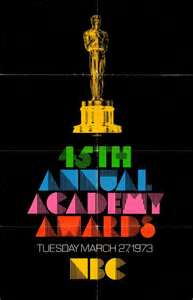
Back 45ste Oscar-toekenningsaand Afrikaans حفل توزيع جوائز الأوسكار الخامس والأربعون Arabic Premios Óscar de 1972 AST Награди „Оскар“ (45-а церемония) Bulgarian Premis Oscar de 1972 Catalan Oscaruddelingen 1973 Danish Oscarverleihung 1973 German Βραβεία Αμερικανικής Ακαδημίας Κινηματογράφου 1972 Greek 45.ª edición de los Premios Óscar Spanish 45. Oscar Sariak Basque
| 45th Academy Awards | |
|---|---|
 | |
| Date | March 27, 1973 |
| Site | Dorothy Chandler Pavilion Los Angeles, California |
| Hosted by | Carol Burnett, Michael Caine, Charlton Heston and Rock Hudson |
| Produced by | Howard W. Koch |
| Directed by | Marty Pasetta |
| Highlights | |
| Best Picture | The Godfather |
| Most awards | Cabaret (8) |
| Most nominations | Cabaret and The Godfather (10) |
| TV in the United States | |
| Network | NBC |
| Duration | 2 hours, 38 minutes |
The 45th Academy Awards were presented Tuesday, March 27, 1973, at the Dorothy Chandler Pavilion in Los Angeles, California, honoring the best films of 1972. The ceremonies were presided over by Carol Burnett, Michael Caine, Charlton Heston, and Rock Hudson.
The ceremony was marked by Marlon Brando's boycott of the Oscars, and his sending of Sacheen Littlefeather to explain why he could not show up to collect his Best Actor award for The Godfather; and by Charlie Chaplin's only competitive Oscar win, for Best Original Dramatic Score for his 20-year-old film Limelight, which was eligible because it did not screen in Los Angeles until 1972.[1][2] Prior to this ceremony, Chaplin had received 2 Academy Honorary Awards: in 1972 for his lifetime of work; and in 1929 (after having revoked his nominations for Best Director, Actor, and Writing (Original), thereby presenting him with a special award celebrating his multifaceted achievements).
With eight wins for Cabaret, adapted from the Broadway stage musical by Bob Fosse, the film set a record for most Oscar prizes without winning Best Picture. Best Picture winner The Godfather received three Academy Awards.
This year was the first time that two African American women received nominations for Best Actress: Cicely Tyson and Diana Ross.[3] Minnelli accepted her Oscar despite a slight scrape she had incurred while riding a motorcycle. Ross was criticized for running a promotional ad campaign demanding that she win the Best Actress Oscar.[4] Meanwhile, Edward G. Robinson, who died two months before the ceremony, became the second actor to receive his honorary Oscar posthumously, after Douglas Fairbanks (d. 1939) in 1940.
This was also the first year when all the Oscar winners were brought out on stage at the end of the ceremony.[5] The show drew a television audience of 85 million viewers.[6][7]
- ^ Bruce Russell (March 28, 1973). "Cabaret shades Godfather". Leader-Post. Regina, Sask. Reuters. Retrieved June 9, 2013 – via Google News Archive.
The film, withdrawn from U.S. movie theatres in the bitter controversy over Chaplin's political views and private life, qualified by being released for the first time in Los Angeles last year.
- ^ Bret Wood. "Limelight". TCM. Archived from the original on April 20, 2013. Retrieved June 9, 2013.
- ^ Bruce Russell (February 13, 1973). "'Godfather' Gets 11 Oscar Nominations". Toledo Blade. Reuter. Retrieved June 16, 2013.
- ^ Wallechinsky, David; Wallace, Irving (1975). The People's Almanac. Garden City, New York: Doubleday & Company, Inc. p. 846. ISBN 0-385-04060-1.
- ^ John Wayne and the Academy Award Winners: 1973 Oscars on YouTube
- ^ Robinson, Melia (February 27, 2014). "The unbelievable story of Why Marlon Brando rejected his 1973 Oscar for 'The Godfather'". Business Insider. Retrieved June 1, 2020.
- ^ Marlon Brando, Dick Cavett (June 12, 1973). Marlon Brando on Rejecting His Oscar for 'The Godfather' (video). The Dick Cavett Show (television). United States. Event occurs at 0:49. Archived from the original on December 22, 2021. Retrieved May 30, 2020.